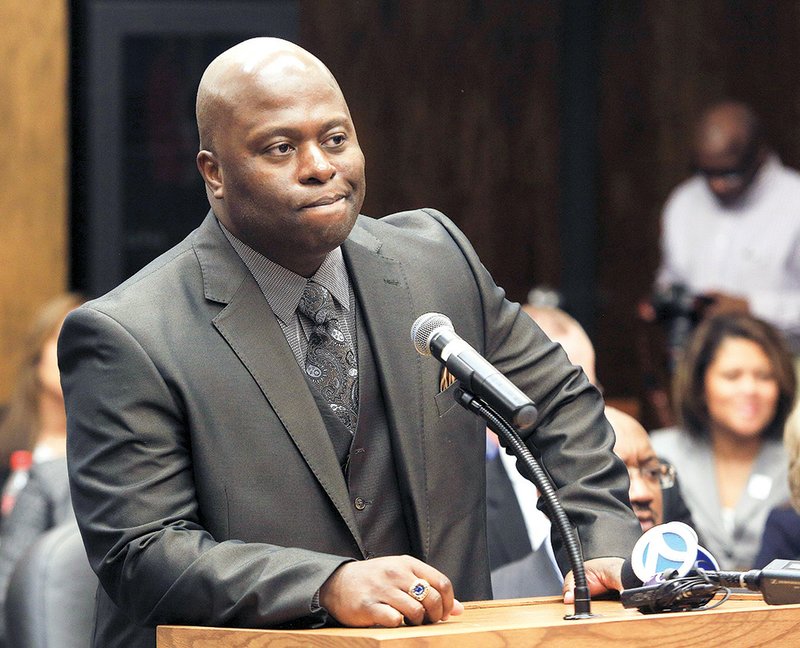After only two years as Little Rock School District superintendent, Dexter Suggs has resigned.
This ends a chapter in Suggs’ career, which began with high expectations. He came into the school district with a reputation for turning urban schools that were failing their students into schools that help students succeed. But Suggs left the district under a cloud of transparency issues, lawsuits, conflict and a plagiarism scandal.
Here’s a look at the career of Suggs as he goes into the next phase of his life:
1968: Dexter Suggs Sr. is born.
He grows up in St. Louis, where he gets involved in gang activity by the seventh grade. He is also shot and stabbed during his time in middle school. He turns his life around after applying to a high school away from the area where he attended middle school. As a high schooler, he is involved in athletics.
1990-1991: Suggs serves in an infantry unit during the Persian Gulf War.
1988-1994: Suggs attends Southern Illinois University in Edwardsville, Illinois. Suggs earns a bachelor’s degree in speech communication.
1995-1997: Suggs attends Indiana Wesleyan University in Marion, Indiana. Suggs earns a master’s degree in education curriculum and instruction.
1999-2000: Suggs attends Indiana University-Purdue University Indianapolis, where he earns his second master’s degree in education administration supervision.
1994-2001: Suggs is a teacher and coach at Ben Davis High School in Indianapolis.
2004-2008: Suggs is a secondary principal in Indianapolis Public Schools, working at Emma Donnan Middle School. He leaves the position after a promotion in 2008.
Nov. 2007: Suggs is awarded a Milken Educator Award. The award comes with a $25,000 prize.
June 2008-July 2009: Suggs serves as director of operations and communications and transportation at Indianapolis Public Schools. He leaves in 2009 after being promoted to help a reorganized department.
July 2009-January 2010: Suggs is secondary principal at Indianapolis Public Schools again. He leaves the position after a promotion.
2004-2009: Suggs receives his doctorate in education from Indiana Wesleyan University. His dissertation is titled “The Impact of Middle School Principal Leadership on the Integration of Technology in Selected Middle Schools Within the Indianapolis Public School District.”
Feb. 2013: Suggs is one of the four finalists interviewed to replace Morris Holmes, the previous Little Rock School District superintendent who had announced his resignation March 22, three months before his contract, which began in January 2011, expired.
March 5, 2013: The Little Rock School District Board of Education selects Suggs to be the district’s new superintendent. According to the district, School Board President Dianne Curry stated, “We believe he has the talent, experience and commitment necessary to help our students achieve their full potential and help us fulfill our mission of creating excellence for tomorrow.”
Oct. 2013: Rep. John Walker serves as attorney for black families in a desegregation lawsuit against the district challenging the practice of assessing fines on students who are tardy or missing summer classes. Walker has said the fees are used to keep students out of those classes. According to the Arkansas Times, Suggs set restrictions on Walker’s visits to the district’s offices, accusing Walker of harassing and intimidating employees.
Jan. 2014: Six Little Rock School District administrative employees are told their jobs will be eliminated by nonrenewal notices. According to the Arkansas Democrat-Gazette, the affected jobs and their salaries include: Karen DeJarnette, director of planning, research and evaluation, $108,036; Wanda Huddle, director of curriculum and social studies, $121,476; Irma Routen, grant project director and music director, $81,146; Marion Woods, director of physical education and health, $107,807; Linda Newburn, secretary and English department, $43,044; and Blondell Taylor, secretary of curriculum-social studies, $45,696.
April 2014: Suggs rescinds all six nonrenewal notices after a hearing with the employees and their attorney, Walker.
The Little Rock School District is sued by Little Rock Education Association, which represents the district’s employee groups. Suggs is named as a defendant in the suit from 20 Reading Recovery program teachers who were told they must reapply for their jobs, the Democrat-Gazette reported.
Jan. 28, 2015: Suggs is named interim superintendent of the district after the Arkansas Board of Education votes 5-4 for dismissing the elected school board and having the state assume control.
March 9, 2015: Walker files House Bill 1905, which would require a minimum score of 16 on the ACT for superintendents of a school district with more than 1,000 students. This bill partially stems from a deposition of Suggs by Walker where Suggs stated that he scored betwen a 13 and 15 on his ACT.
April 15, 2013: Blue Hog Report, a website operated by lawyer Matt Campbell, accuses Suggs of plagiarizing sections of his 2009 dissertation. Campbell posts sections of Suggs’ dissertation, as well as the corresponding passages he is accused of plagiarizing. According to the Democrat-Gazette, Suggs denied the plagiarism accusation, saying that he did not feel that he intentionally “committed any fraud or plagiarism of a particular nature.”
April 21: Suggs resigns as Superintendent of Little Rock Schools. According to the Arkansas Times, a motion is filed in a lawsuit claiming Suggs was determined to punish teacher Teresa Knapp Gordon for filing an ethics complaint against Suggs. The lawsuit accuses Suggs of sending disciplinary notices to teachers at Jefferson Elementary School accusing them of unauthorized use of the school property, theft and misuse in connection to summer and afterschool programs, as well as failure to account for activity funds.
